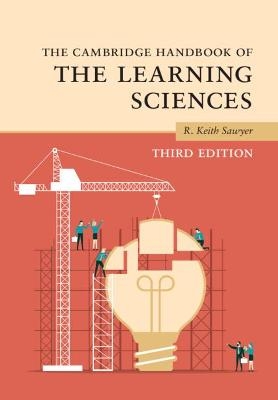
The Cambridge Handbook of the Learning Sciences
Cambridge University Press (Verlag)
978-1-108-84098-9 (ISBN)
- Lieferbar (Termin unbekannt)
- Versandkostenfrei innerhalb Deutschlands
- Auch auf Rechnung
- Verfügbarkeit in der Filiale vor Ort prüfen
- Artikel merken
The interdisciplinary field of the learning sciences encompasses educational psychology, cognitive science, computer science, and anthropology, among other disciplines. The Cambridge Handbook of the Learning Sciences, first published in 2006, is the definitive introduction to this innovative approach to teaching, learning, and educational technology. In this significantly revised third edition, leading scholars incorporate the latest research to provide seminal overviews of the field. This research is essential in developing effective innovations that enhance student learning - including how to write textbooks, design educational software, prepare effective teachers, and organize classrooms. The chapters illustrate the importance of creating productive learning environments both inside and outside school, including after school clubs, libraries, and museums. The Handbook has proven to be an essential resource for graduate students, researchers, consultants, software designers, and policy makers on a global scale.
R. Keith Sawyer, the Morgan Distinguished Professor at the University of North Carolina at Chapel Hill, studies creativity, innovation, and learning, with a focus on collaborating groups and teams. He is the author or editor of seventeen books, including Reflections on the Learning Sciences (2016) and The Creative Classroom: Innovative Teaching for 21st-Century Learners (2019).
Preface R. Keith Sawyer; 1. An introduction to the learning sciences R. Keith Sawyer; Part I. Foundations: 2. Foundations of the learning sciences Mitchell J. Nathan, R. Keith Sawyer; 3. Scaffolding Brian J. Reiser, Iris Tabak; 4. Project-based learning Joseph S. Krajcik, Namsoo Shin; 5. Metacognition and self-regulated learning Philip H. Winne, Roger Azevedo; 6. A history of conceptual change research: Threads and fault lines Andrea A. diSessa; 7. Learning in activity Yrjö Engeström; 8. Cognitive apprenticeship Allan Collins, Manu Kapur; Part II. Methodologies: 9. Design-based research: A methodological toolkit for engineering change Sasha Barab; 10. Analyzing collaboration Noel Enyedy, Reed Stevens; 11. Microgenetic methods Bruce L. Sherin, Clark A. Chinn; 12. A learning sciences perspective on the design and use of assessment in education James W. Pellegrino; 13. Learning analytics and educational data mining Ryan S. Baker, George Siemens; Part III. Grounding Technology in the Learning Sciences: 14. Videogames and learning Constance Steinkuehler, Kurt Squire; 15. Embodiment and embodied design Dor Abrahamson, Robb Lindgren; 16. Tangible and Full-body interfaces in learning Narcis Pares, Michael Eisenberg; 17. Augmented reality in the learning sciences Bertrand Schneider, Iulian Radu; 18. Mobile learning Roy Pea, Mike Sharples; Part IV. Learning Together: 19. Knowledge building and knowledge creation Marlene Scardamalia, Carl Bereiter; 20. Computer-supported collaborative learning Gerry Stahl, Timothy Koschmann, Daniel Suthers; 21. Arguing to learn Jerry Andriessen, Michael Baker; 22. Informal learning in museums Palmyre Pierroux, Karen Knutson, Kevin Crowley; Part V. Learning Disciplinary Knowledge: 23. Research in mathematics education: What can it teach us about human learning? Anna Sfard, Paul Cobb; 24. Science education and the learning sciences: A coevolutionary connection Nancy Butler Songer, Yael Kali; 25. Complex systems and the learning sciences: Educational, theoretical, and methodological implications Michael J. Jacobson, Uri Wilensky; 26. Learning history Mario Carretero, Everardo Perez-Majarrez; 27. Learning to be literate Peter Smagorinsky, Richard E. Mayer; 28. Arts education and the learning sciences Erica Halverson, Kimberly Sheridan; 29. Learning as a cultural process: Achieving equity through diversity Na'ilah Suad Nasir, Ann S. Rosebery, Beth Warren, Carol D. Lee; 30. Designing for meaningful learning: Interest, motivation, and engagement K. Ann Renninger, Sanna Järvelä; 31. Advances in teacher learning research in the learning sciences Barry J. Fishman, Carol K. K. Chan, Elizabeth A. Davis; 32. Learning sciences and policy: A decade of mutual engagement William R. Penuel, James P. Spillane, Min Sun; 33. The learning sciences in the 2020s: Implications for schools and beyond R. Keith Sawyer.
| Erscheinungsdatum | 07.04.2022 |
|---|---|
| Reihe/Serie | Cambridge Handbooks in Psychology |
| Zusatzinfo | Worked examples or Exercises |
| Verlagsort | Cambridge |
| Sprache | englisch |
| Maße | 182 x 259 mm |
| Gewicht | 1510 g |
| Themenwelt | Geisteswissenschaften ► Psychologie ► Allgemeine Psychologie |
| Geisteswissenschaften ► Psychologie ► Pädagogische Psychologie | |
| Geisteswissenschaften ► Psychologie ► Verhaltenstherapie | |
| Sozialwissenschaften ► Pädagogik ► Allgemeines / Lexika | |
| Sozialwissenschaften ► Pädagogik ► Bildungstheorie | |
| ISBN-10 | 1-108-84098-1 / 1108840981 |
| ISBN-13 | 978-1-108-84098-9 / 9781108840989 |
| Zustand | Neuware |
| Informationen gemäß Produktsicherheitsverordnung (GPSR) | |
| Haben Sie eine Frage zum Produkt? |
aus dem Bereich


